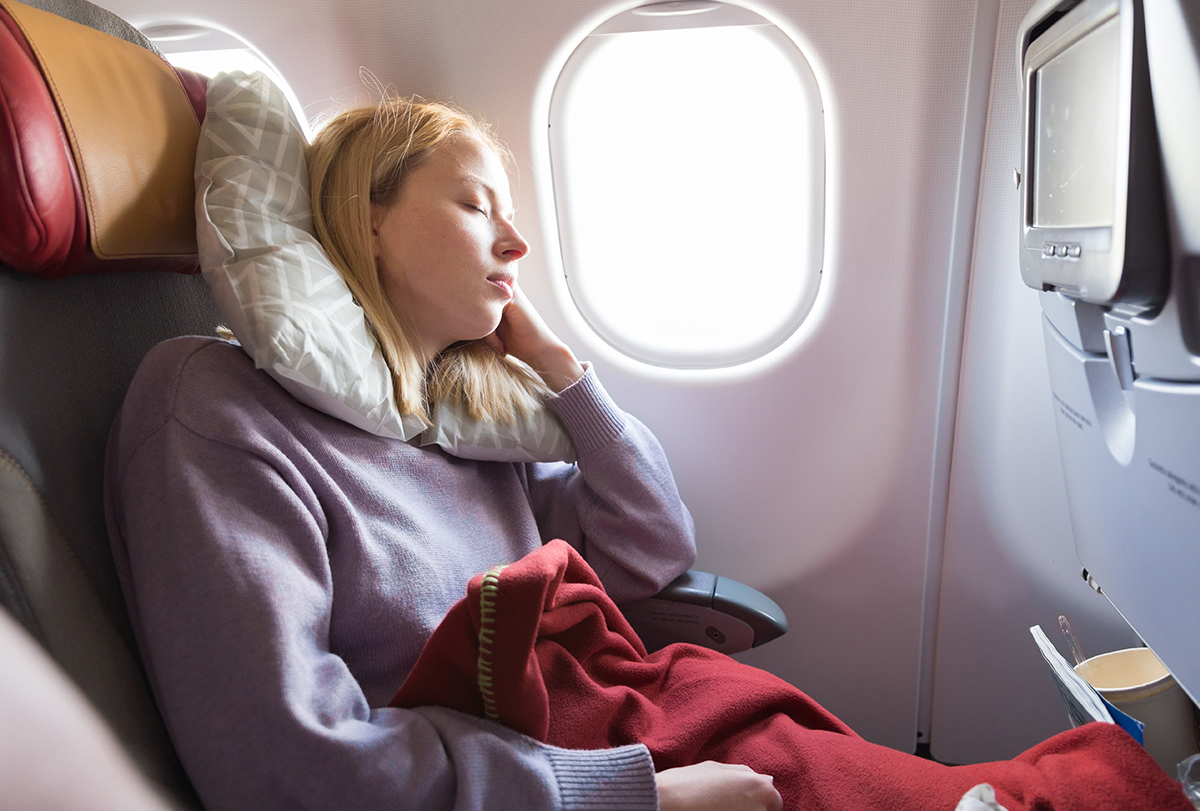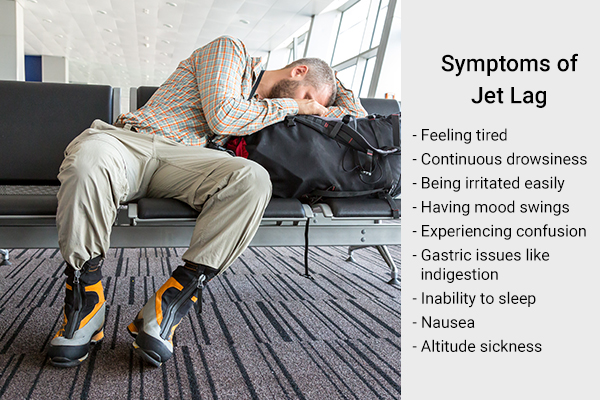In this article:
The circadian rhythm or the body’s sleep-wake cycle may often get disturbed due to traveling from one time zone to another. Jet lag is a famously known sleep disorder.

The medical term for jet lag is desynchronosis or circadian dysrhythmia. Although it is an acute illness, it can disturb your daily tasks in various ways, as it may cause:
- Tiredness
- Indigestion
- Stomach issues
- Sleepiness
Although these symptoms aren’t threatening, they can have adverse effects on your health. For instance, it can interfere with various biological tasks, including bowel movements, maintenance of body temperature, and synthesis and secretion of hormones, which enable you to perform your daily tasks effectively. (1)
Getting yourself ready for jet lag can help you save yourself from the condition on your next trip. (2)
Ways to Reduce Jet Lag
Although jet lag cannot be totally prevented, there are things you can do to reduce its effects.
1. Take a nap when traveling

If you’re traveling during the daytime, it can be helpful to take a quick nap on the plane to help your body adjust to the new schedule.
Bringing earplugs and an eye mask can help create a peaceful environment by blocking out unwanted light and noise. A power nap of 20–30 minutes can be refreshing, especially if you still have a long time until your planned bedtime.
However, it’s important to note that sleeping for longer than the recommended time can actually disrupt your nighttime sleep and lead to restlessness.
So, take advantage of the opportunity for a short nap but avoid overdoing it to ensure a restful night’s sleep. (3)
2. Stay awake if arriving at nighttime
If you’re traveling to a destination where you’ll be landing at nighttime, it’s a good idea to stay awake for a few hours before your arrival. Engaging in some screen time can help you reset your sleep schedule and prevent you from feeling too sleepy when you arrive.
Once you arrive, it’s important to give your body the rest it needs to adjust to the new time zone. Sleeping through the night and waking up in the morning will help you feel refreshed and ready to tackle the day ahead.
Choosing a flight that allows you to arrive in the early evening can be beneficial since it gives you time to adjust and stay up until your desired bedtime in the new time zone. This can help ease the transition and prevent any sleep disruptions.
For those attending important meetings or events, arriving a few days before the scheduled time can be very helpful in adjusting to the new time zone. This can help ensure that you are fully rested and alert for the important event, rather than feeling jet lagged and tired. (3)
3. Prepare your diet for the new time zone

If you’re traveling toward the east, it can be helpful to adjust your sleep schedule a few days before your departure by waking up a few hours earlier.
Conversely, if you’re traveling towards the west, adjusting your sleep schedule to stay up later and wake up later can be beneficial in preparing your body for the time zone change.
Moreover, it’s important to be mindful of the impact of food and drinks on your body’s natural clock. Caffeine and alcohol can disrupt your sleep and should be avoided. (4) Sugary and salty foods should also be avoided, while fresh fruits and vegetables can help prevent jet lag. (5)
Additionally, refrain from overeating. A balanced diet can help alleviate symptoms of jet lag such as sleeplessness, fatigue, bloating, and indigestion. By being conscious of what you eat and drink, you can help minimize the impact of jet lag on your body.
4. Stretch a little on the flight
When you’re on a long flight, it’s common to experience discomfort from sitting in one place for extended periods. To alleviate this, incorporate some easy exercises while on the flight, such as stretching your legs whenever possible.
It’s important to be considerate of other passengers and only do these exercises when it’s safe to do so and won’t disrupt their comfort.
If you have to change flights during your journey, taking a walk around the airport can be even more beneficial than simply waiting at the departure gate.
This can help your body regain alertness and reduce any feelings of stiffness or discomfort from being in a seated position for a long time. (6)
5. Get some sun
The sun plays an important role in regulating our body’s natural sleep-wake cycle. When you see the sun, your body recognizes that it’s time to start the day and wake up accordingly.
If you’re traveling to a new destination, getting some sunlight during the daytime can help your body adjust to the new time zone and reduce the effects of jet lag.
If going outside for a walk isn’t possible or convenient, you can use artificial lights to simulate daylight and keep your body active during the day.
This can be especially helpful in the days after arriving in a new time zone, when your body is still adjusting to the new schedule. For example, if you’re traveling westward, spending time in bright afternoon light can help delay your sleep time. (7)
6. Plan your daily routine according to the new time zone

In addition to adjusting your eating habits, aligning your other daily routines, such as bowel movements and sleep, with the new time zone is recommended as well. This can help your body establish a new rhythm and adjust more easily to the local schedule.
If you’re having trouble sleeping, taking a hot bath before bed can help you relax and fall asleep more easily. (8)
7. Stay hydrated
Maintaining proper hydration is crucial when traveling by air, as air travel can easily cause mild dehydration, which can worsen the symptoms of jet lag.
To avoid this, make sure to drink plenty of fluids before, during, and after your flight. However, avoid beverages that can promote dehydration, such as caffeine and alcohol.
Even though you might think that drinking coffee can help you stay alert and alcohol can help you sleep, the truth is that both can disrupt your sleep cycle and make jet lag symptoms worse.
So, stick to water, herbal tea, or other nonalcoholic and noncaffeinated beverages to keep your body hydrated and ready to adjust to the new time zone. (9)
Medical Interventions for Jet Lag and Air Travel
Medications are typically not required for managing jet lag. As the body adjusts to the new time zone, the symptoms of jet lag often improve within a few days. (10)
But here are some things to keep in mind, especially if you are diabetic or pregnant or suffer from a chronic illness.
1. Melatonin-containing medicine
Melatonin is a hormone that your body naturally produces when it’s time to sleep.
If you’re having difficulty sleeping at night when you arrive at your destination due to jet lag, you can take a medication containing melatonin. It’s important to take it right before bedtime, as it can make you feel drowsy.
Additionally, there are over-the-counter medications for insomnia that can help you fall asleep. However, it’s crucial to speak with your doctor about the proper dosage and usage. (11)(12)
2. Traveling with diabetes
When traveling across multiple time zones, it’s important to consider how it may affect your insulin needs. Here’s what to keep in mind:
- It is recommended for passengers to keep their medications with them during the flight, including medicinal liquids such as insulin. These liquids can be carried in quantities over the 100-mL limit as long as their identity is verified. (13)
- The dosage and timing of insulin may need to be adjusted based on factors such as the duration of your trip, the availability of food, and your level of physical activity.
- It’s important to frequently monitor your blood sugar levels, as maintaining tight control can be challenging due to the many changes that come with traveling.
- It’s also important to note that the target glucose levels should be increased, as the risk of hypoglycemia is higher during travel. (13)
- It may be necessary to modify your insulin regimen based on the amount of time that has passed since you left your home time zone, rather than the current local time.
3. Pregnancy and air travel
Generally, it is considered safe for women to travel by air until their 36th week of pregnancy if their pregnancy has been uncomplicated. However, if a woman has a high-risk pregnancy, it is important to consult with a doctor before flying.
If a woman is in her 9th month of pregnancy and plans to fly, she must obtain written approval from her doctor.
It is important to wear seat belts during the flight, positioning them below the abdomen and across the hips to ensure the safety of both the mother and the unborn child. (14)
4. Traveling with chronic illness
While this article focuses on the effects of jet lag, it’s essential to note that individuals with chronic conditions such as congenital heart disease, chronic lung disease, and anemia should consult their doctor before traveling by air. This is because the change in air pressure and altitude during a flight can impact their health and well-being.
It’s always better to be safe than sorry, and seeking professional medical advice before embarking on air travel can ensure a comfortable and healthy journey.
Symptoms of Jet Lag
Here are the most commonly experienced symptoms of jet lag: (2)

- Feeling tired
- Continuous drowsiness
- Being irritated easily
- Mood swings
- Confusion
- Gastric issues such as indigestion
- Inability to sleep
- Nausea
- Altitude sickness
Most-Asked Questions About Jet Lag
What causes jet lag?
The body is accustomed to a specific pattern according to the time zone you live in. This 24-hour cycle can be disrupted when you visit new places that have drastically different timelines.
Spending the daytime at home and then hopping on a 12-hour flight to a place with more sun can be exhausting and a big adjustment to your body. This is because, usually, you’ll look forward to a peaceful night’s sleep with a dark sky after a sunny day out. (4) As a result, jet lag occurs.
What is travel fatigue?
It is not always the huge difference in time zones that lead to jet lag. Sometimes, when you’re on a flight for a long time, at a high altitude, there’s a change in cabin pressure that may contribute to travel fatigue, leading to jet lag. (15)
Final Word
Jet lag does not resolve in a few hours; it can take your body a few days to a week to adjust to the new time zone.
Once you adjust your sleep, meal, and work schedule according to the new day-night change, your body will slowly get back to normal. Thus, allow yourself some time to come to terms with your newly developed schedule!
- Was this article helpful?
- YES, THANKS!NOT REALLY


